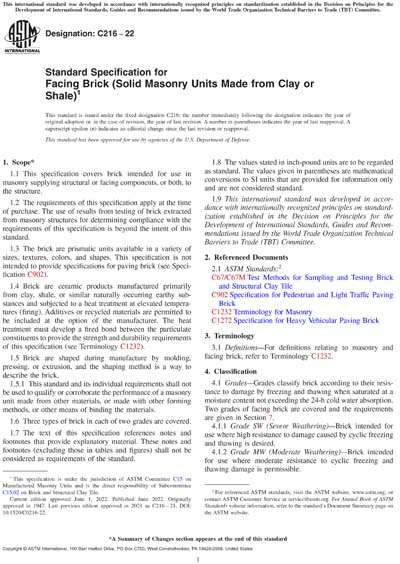Historical
ASTM C216-22
Standard Specification for Facing Brick (Solid Masonry Units Made from Clay or Shale)
1.1This specification covers brick intended for use in masonry supplying structural or facing components, or both, to the structure.
1.2The requirements of this specification apply at the time of purchase. The use of results from testing of brick extracted from masonry structures for determining compliance with the requirements of this specification is beyond the intent of this standard.
1.3The brick are prismatic units available in a variety of sizes, textures, colors, and shapes. This specification is not intended to provide specifications for paving brick (see Specification C902).
1.4Brick are ceramic products manufactured primarily from clay, shale, or similar naturally occurring earthy substances and subjected to a heat treatment at elevated temperatures (firing). Additives or recycled materials are permitted to be included at the option of the manufacturer. The heat treatment must develop a fired bond between the particulate constituents to provide the strength and durability requirements of this specification (see Terminology C1232).
1.5Brick are shaped during manufacture by molding, pressing, or extrusion, and the shaping method is a way to describe the brick.
1.5.1This standard and its individual requirements shall not be used to qualify or corroborate the performance of a masonry unit made from other materials, or made with other forming methods, or other means of binding the materials.
1.6Three types of brick in each of two grades are covered.
1.7The text of this specification references notes and footnotes that provide explanatory material. These notes and footnotes (excluding those in tables and figures) shall not be considered as requirements of the standard.
1.8The values stated in inch-pound units are to be regarded as standard. The values given in parentheses are mathematical conversions to SI units that are provided for information only and are not considered standard.
1.9This international standard was developed in accordance with internationally recognized principles on standardization established in the Decision on Principles for the Development of International Standards, Guides and Recommendations issued by the World Trade Organization Technical Barriers to Trade (TBT) Committee.
Content Provider
ASTM International [astm]






